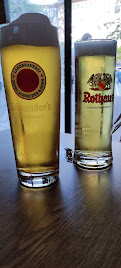Every so often something comes along claiming that it will solve a particular problem. They come in many forms - superfoods which will give you a wet nose and a glossy coat if you eat enough of the right...
Every so often something comes along claiming that it will solve a particular problem. They come in many forms - superfoods which will give you a wet nose and a glossy coat if you eat enough of the right stuff - knee supports that fool the gullible into thinking that buying them will solve your bone on bone knee problems and obviate the need for surgery - that one got me - they don't - and so on and so forth. The simple fact is that when someone comes up with such things is that they rarely pass the smell test, so let's have a look at one that has recently come up in the beer industry.
"Fresh ale" is the latest thing, it seems. What's that, you may well ask? You may reasonably be thinking, "that'll be beer that is served before it gets too old" - and why wouldn't you? After all, they do this in some brew pubs where the beer is sold straight from conditioning tanks, so that'll be fresh, won't it? Or what about cask beer - live beer served from a cask - that has only a short shelf life. No, that's not it either, it seems. What about the initiative, launched only as recently as September by the Campaign for Real Ale (CAMRA) and the Society of Independent Brewers (SIBA) called Drink Fresh Beer? This is "A campaign that recognises cask beer is in “steep, sustained decline” and is struggling to shake its “male, pale and stale” image will be launched at the Future of Cask Seminar on Thursday 22 September". That must be it then, surely? Well no. Guess again. It isn't that, either.
So what is it? It is a new keg beer, that's what. And you'll not be at all surprised to find out that it is "different and exciting." What could it be, I hear you ask? Well, Drinks Business has the lowdown. It's a keg beer with lower carbonation, developed by Otter Brewery. It is explained thus:
"When we put it into a keg we actually low-carbonate it, so it has a much gentler and softer carbonation which is designed to emulate the carbonation of cask ale as far as taste goes in terms of mouthfeel. The second major difference is that when it is served, it doesn’t run through chillers in the cellar. Instead, it runs through the python or whatever assets the pub has to allow the dispense temperature to be around between 8.5 – 10?. So, it is slightly cooler than cask ale, but it is not as cold as keg, and it is slightly fizzier than cask ale, but it’s not as harshly carbonated as keg".
Now at this point, rather than quote more chunks of the Drinks Business article, I urge you to read it for yourself, though I will offer comment on one more paragraph, and it is this: "CAMRA should be for it, not against it, he insisted.(The guy from Otter Brewery) After all, “CAMRA now promotes ‘World beers’ which are in keg. If they are doing that, why wouldn’t they look at something brewed in the UK that is in keg and talk about it just as favourably?”
Now, of course, even a cursory read through this will have most readers thinking that there is nothing new here at all. This is just another keg beer positioned to fill and bridge the so-called gap between younger and older drinkers, lager and ale drinkers and traditionalist and modernisers. We have been here before, and they have failed before. In Lancashire parlance, they are neither nowt nor summat, and will almost certainly be seen as such by the drinking public.
There is however another point. It can and in this instance, clearly is, the case that in bending over backwards to "modernise" in an attempt to bring in younger drinkers to the cause, CAMRA is giving the impression to many, that real ale - cask conditioned beer - is just part of its mix rather than its reason to be. That is a dangerous position to be in.
When the champion of cask conditioned beer appears to the trade and trade press to have a negotiable position on the subject, alarm bells should be ringing at CAMRA HQ.
The already weak case for this "breakthrough" is undermined by admitting the longer shelf life of this non-live product is a key feature. Otter also assures us that this is not a fad product. Let me know in the comments.
Let's hope that if fresh beer is as relevant as it should be, that CAMRA and SIBA put some more welly into their original initiative. Cask beer may be suffering, but it doesn't yet need replacing with keg.















